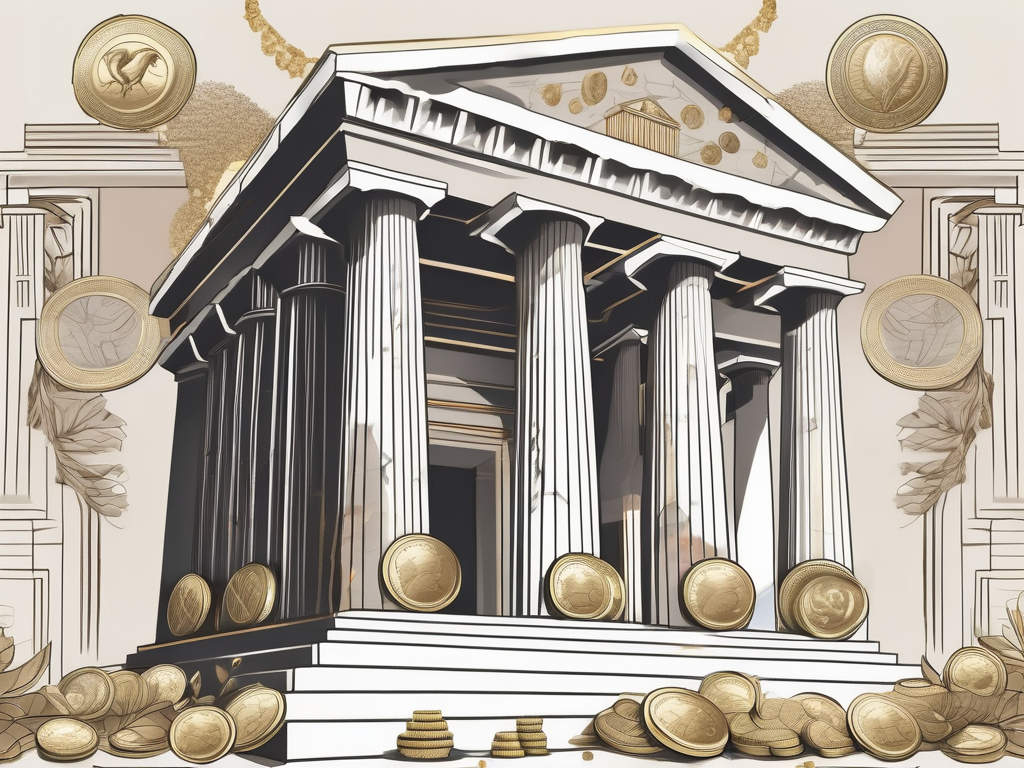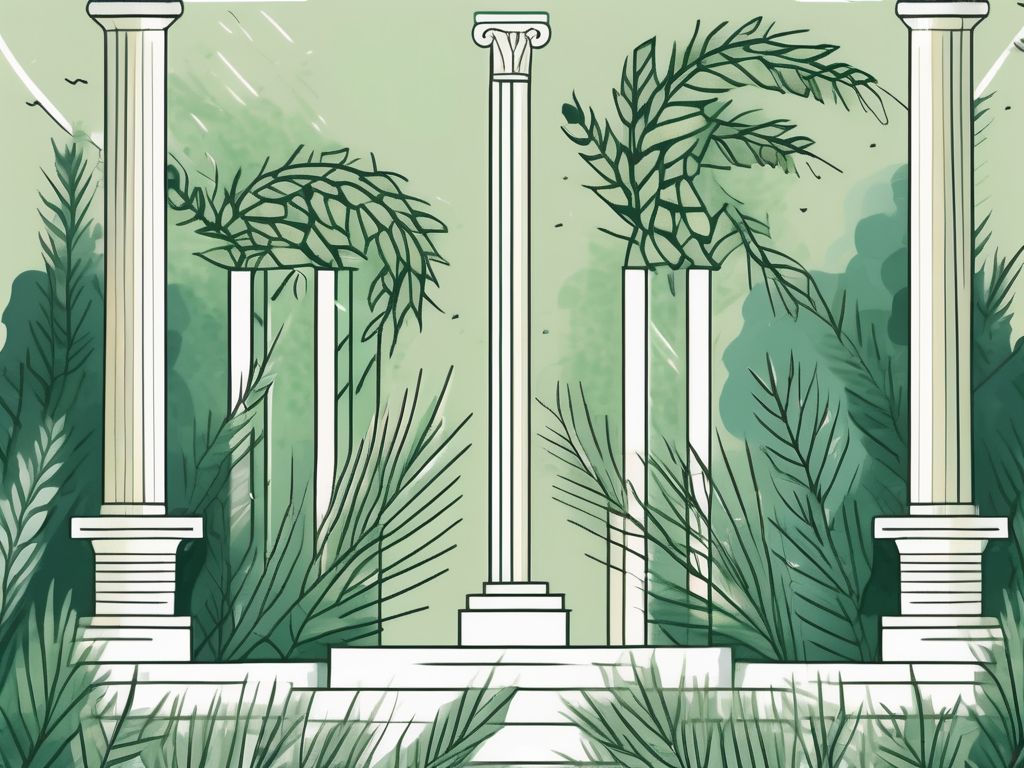In Greek mythology, Plutus is the god of wealth and abundance. He plays a significant role in the ancient tales and legends, and his symbolism continues to be explored and interpreted even in today’s society. Let’s dive into the fascinating realm of Plutus and uncover the stories and symbolism associated with this intriguing deity.
Understanding Plutus: A Brief Introduction
Before we delve into the mythology and symbolism, let’s take a moment to introduce Plutus. In Greek mythology, Plutus is the son of Demeter, the goddess of the harvest, and Iasion, a mortal prince. He is often depicted as a young and blindfolded boy, symbolizing the unpredictable nature of wealth.
Plutus is known for his dual nature, representing both the prosperity and the potential dangers of amassing wealth. His depiction in ancient literature offers valuable insights into how the Greeks perceived the concept of wealth and its implications.
But what exactly does it mean to understand Plutus? To truly grasp the essence of this mythological figure, we must explore his role in Greek mythology and the lessons he imparts.
The Role of Plutus in Greek Mythology
In Greek mythology, Plutus is often connected to the god of the underworld, Hades. Some legends suggest that Plutus acts as a conduit between the upper and lower worlds, ensuring that wealth is distributed appropriately. It is said that he grants riches to those deemed worthy and just, while withholding his blessings from the immoral and greedy.
Plutus’s role in Greek mythology serves as a reminder that wealth should be earned and used responsibly. The ancient Greeks believed that true abundance comes not only from material possessions but also from leading a virtuous and balanced life.
Imagine a world where wealth is distributed based on one’s character and actions. Plutus embodies this ideal, rewarding those who embody virtues such as honesty, generosity, and compassion. His role as a gatekeeper of wealth encourages individuals to strive for moral excellence in their pursuit of prosperity.
The Depiction of Plutus in Ancient Literature
Ancient Greek literature offers a vivid portrayal of Plutus and his impact on mortal lives. Writers such as Hesiod and Homer often spoke of the lure and dangers of wealth, cautioning against excessive greed and materialism.
One famous story involving Plutus is the myth of King Midas, who was granted the power to turn everything he touched into gold. While initially delighted by his newfound wealth, Midas soon realized the emptiness and isolation that accompanied his riches. This tale serves as a reminder that wealth alone does not bring true happiness.
Through these ancient texts, the Greeks conveyed the importance of balance and moderation in one’s pursuit of wealth. They recognized that material possessions are fleeting and that the true measure of wealth lies in contentment and fulfillment.
Plutus’s depiction in ancient literature also highlights the complex relationship between wealth and power. In Greek society, the accumulation of wealth often translated into political influence and social status. However, the Greeks understood that true power lies not in the possession of riches, but in the responsible and ethical use of wealth for the betterment of society.
As we continue our exploration of Plutus, we will uncover more fascinating aspects of this mythological figure and the lessons he teaches us about wealth, virtue, and the human condition. Stay tuned for further insights into the enigmatic world of Plutus!
The Symbolism of Plutus
Plutus’s symbolism extends far beyond his role as the god of riches. Through various interpretations, we can gain a deeper understanding of the cultural significance of wealth and its impact on individuals and societies.
Plutus as a Symbol of Wealth and Abundance
As the god of wealth, Plutus embodies the concept of abundance and prosperity. His presence in Greek mythology highlights the importance that ancient societies placed on acquiring material resources.
In ancient Greece, wealth was not just seen as a means of personal gain, but also as a way to contribute to the well-being of the community. Plutus, with his overflowing cornucopia, symbolizes the idea that wealth, when shared and distributed wisely, can bring about prosperity for all.
Furthermore, Plutus’s association with abundance goes beyond material possessions. It also encompasses the richness of knowledge, wisdom, and experiences that can be gained through the pursuit of wealth. In this sense, Plutus encourages individuals to strive for not only financial success but also personal growth and fulfillment.
Plutus as a Reminder of the Impermanence of Wealth
Plutus’s representation as a blindfolded youth symbolizes the unpredictable and often irrational nature of wealth. Just as fortune can change in an instant, so too can one’s economic circumstances. This symbolism reminds us of the impermanence of material possessions and encourages a balanced approach to wealth accumulation.
In ancient Greece, the blindfolded Plutus served as a reminder that wealth should not be hoarded but rather circulated within society. The Greeks believed that by sharing their wealth, individuals could create a more equitable and harmonious community.
Additionally, the blindfold represents the inherent limitations of wealth. No matter how much one accumulates, it cannot guarantee true happiness or fulfillment. Plutus’s blindfold reminds us that true wealth lies not only in material abundance but also in intangible qualities such as love, friendship, and personal growth.
The Dual Nature of Plutus: Wealth and Greed
While Plutus represents wealth, he also serves as a cautionary symbol against excessive greed. The ancient Greeks understood that an insatiable desire for riches could lead to moral corruption and the downfall of individuals and societies.
Plutus’s blindfold suggests that wealth can blind people to more significant aspects of life, such as compassion, generosity, and spiritual fulfillment. It serves as a reminder that the pursuit of wealth should not come at the expense of one’s moral values and the well-being of others.
In Greek mythology, there are numerous tales of individuals who, consumed by their greed for wealth, ultimately faced tragic consequences. These stories serve as warnings against the dangers of unchecked avarice and highlight the importance of maintaining a balanced perspective on wealth.
Plutus’s duality as a symbol of both wealth and greed encourages individuals to reflect on their own relationship with money and material possessions. It prompts us to consider how we can use our wealth responsibly and ethically, ensuring that it brings about positive change in our lives and the lives of others.
The Worship and Cult of Plutus
During ancient times, Plutus was worshipped and honored through various rituals and practices. Temples and sacred sites dedicated to him were constructed throughout Greece, serving as gathering places for worshippers and seekers of wealth.
Ancient Rituals and Practices
Cults devoted to Plutus offered prayers, sacrifices, and rituals to seek his favor and blessings. Devotees believed that by appeasing Plutus, they could secure material abundance and financial prosperity.
These rituals often involved offerings of food, wine, and incense, symbolizing the exchange between mortals and the divine. The importance placed on these practices highlights the significance of wealth in ancient Greek society and the desire to seek favor from Plutus.
Temples and Sacred Sites Dedicated to Plutus
Throughout Greece, many temples were erected to honor Plutus. These sanctuaries served as places of worship and pilgrimage where individuals sought solace, guidance, and blessings related to wealth.
The construction of temples dedicated to Plutus emphasizes the cultural importance and reverence ancient Greeks had for wealth and its spiritual implications. It reveals a society that recognized the interconnectedness of material and divine realms.
Plutus in Modern Interpretations
Although the worship of Plutus waned with the decline of ancient Greek civilization, his symbolism continues to inspire contemporary artists, writers, and thinkers. Plutus’s enduring legacy speaks to humanity’s enduring fascination with wealth and its impact on our lives.
Plutus in Contemporary Literature and Art
In modern literature, Plutus often appears as a symbol of opulence, privilege, and the pursuit of financial success. Writers use Plutus as a metaphor to explore themes of greed, inequality, and the moral complexities of accumulating wealth.
Contemporary artists also find inspiration in Plutus, using his image to comment on the cultural obsession with money, materialism, and the disparity between the rich and the poor. Through their work, they strive to provoke thought and encourage reflection on the true meaning of abundance.
The Influence of Plutus on Modern Concepts of Wealth
Plutus’s symbolism continues to impact our perception of wealth in the modern era. As societies navigate the complexities of globalization and economic inequality, the lessons embedded in Plutus’s mythology remain relevant.
Plutus reminds us to be conscious of our relationship with wealth and its social implications. He prompts us to question the ethics of extreme wealth accumulation and advocate for a more equitable distribution of resources, ensuring a prosperous future for all.
Conclusion: The Enduring Legacy of Plutus
The Greek god of wealth, Plutus, holds a unique place in mythology and symbolism. His intriguing tales and dualistic nature continue to captivate our imaginations and challenge our understanding of wealth.
The Relevance of Plutus in Today’s Society
Plutus’s mythology reminds us to approach wealth with mindfulness and moderation. In a world driven by consumerism and materialism, we must remember that true abundance encompasses more than just financial prosperity.
By embracing the lessons embedded in Plutus’s tales, we can strive for a healthier and more equitable relationship with wealth, one that prioritizes the well-being of individuals and communities.
The Timeless Appeal of the Greek God of Wealth
Plutus’s enduring appeal lies in his ability to spark contemplation and dialogue about the role of wealth in our lives. As long as wealth and its implications continue to shape human existence, the legacy of Plutus will persist, reminding us to seek balance and meaning beyond mere material possessions.












